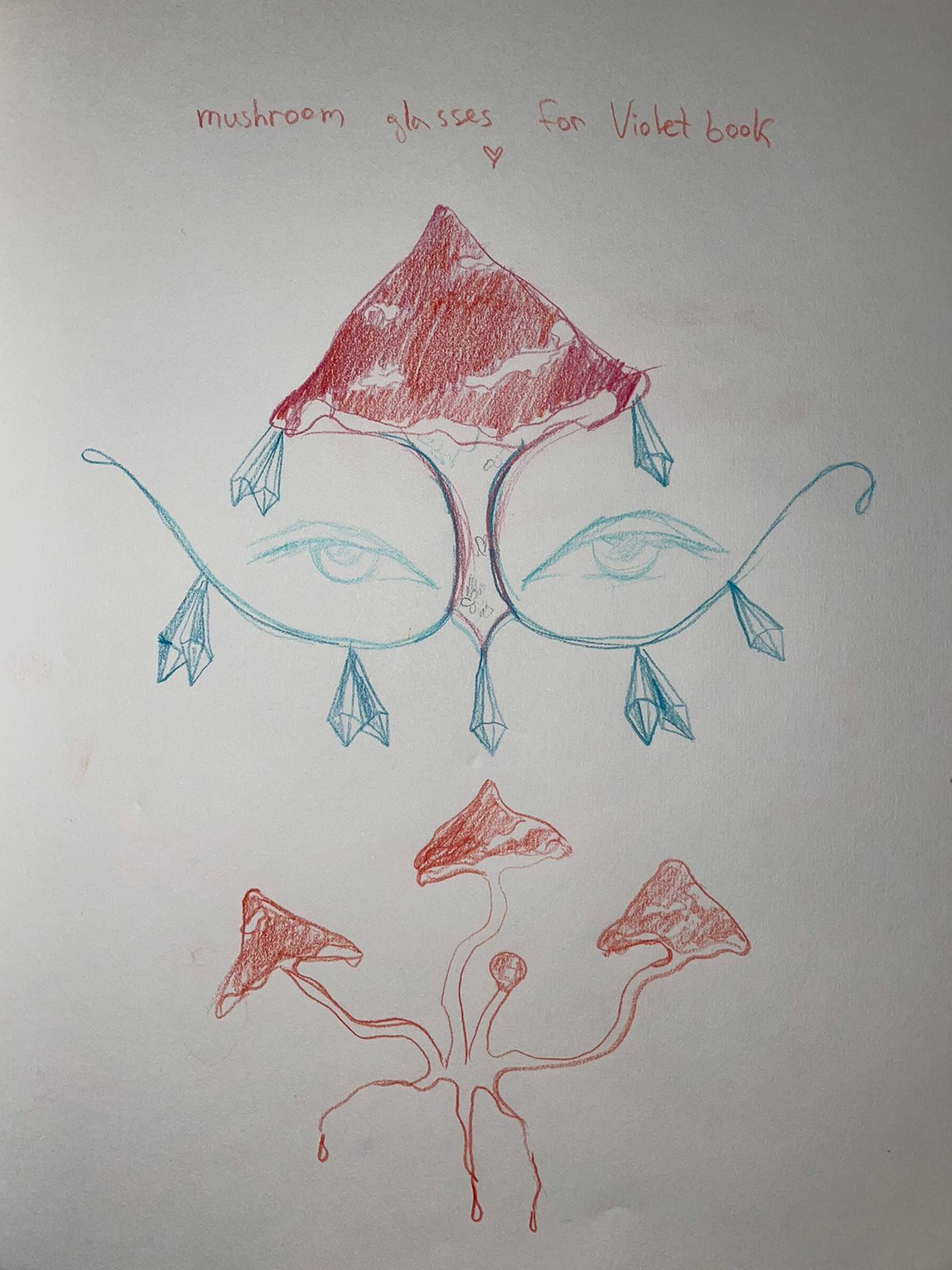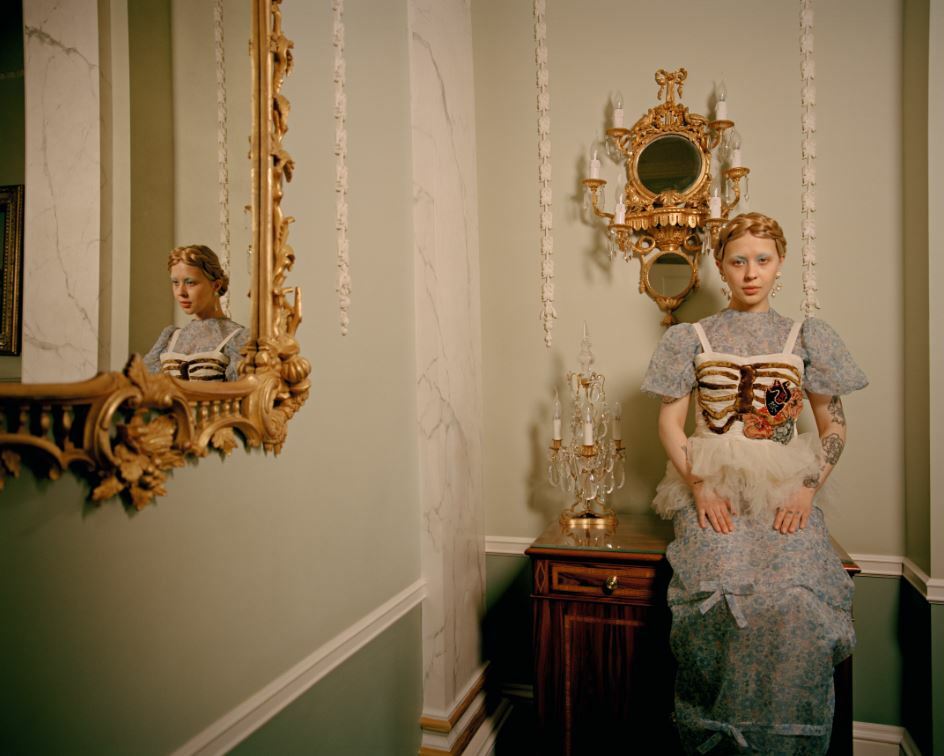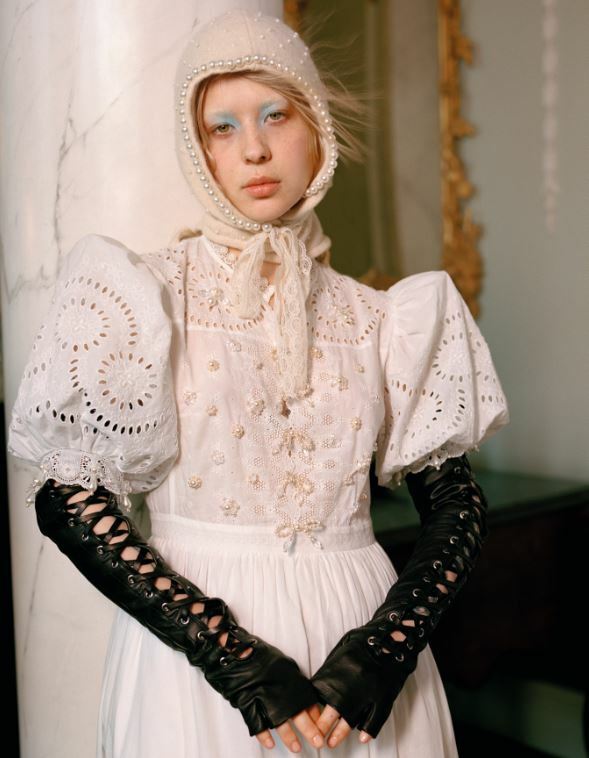
Heart Armour
Published: 2022/11/12
Updated: 2023/01/21
- Photography
- Elena Rendina
- Styling
- Leith Clark
Polina saves, repairs, and reimagines elements of her heritage and her past, bringing them with her into a fantastical future. From glossy beetles to pearls, native embroidery to stories of her great-grandmother, fragments are saved from oblivion and spun into new life in her work.
Her delicate-yet-defiant images have become emblematic of a culture that is at risk of being swallowed up by oppression, and a lack of respect for the delicate arts of creation and preservation.
At the beginning of the year, before the war, Polina spent time in London with Violet shooting this story. An interview with Polina was planned – but as Russia’s conflict with Ukraine unfolded, in lieu of an interview about her work we offered Polina space to speak of her experience and protest of this war in real time.
Polina is now based in Armenia. Below are her words, a personal diary of her experiences which she has sent us as the war has unfolded.
On 24 February 2022 I woke up to the sound of notifications on my phone. It was messages from Ukrainian and Russian friends. From that moment life was divided into before the war and after the war started. I cried for hours, hoping I was in a surreal nightmare. At 8 p.m. I was already at a protest against the war in Ukraine on Pushkin Square in Moscow (back then the word war was not yet banned in Russia). Many people were arrested. At that time, I was still hoping that I was in a nightmare, that it would end, that I would wake up and there would be no war.
…
On the second day I was unable to protest, because I was on a train between Moscow and St. Petersburg. I was frantically updating my newsfeed with pictures of the destruction of Ukrainian cities and lists of people arrested at the protests in Russia.
That morning a reader [Instagram follower] wrote to me, her name is Anya, and she lives in Chernihiv, Ukraine. Chernihiv is on the border with Belarus and Russia, it will be one of the most difficult destinations. We started to correspond every day and became friends.
On February 25th Anya sent me a video from a bomb shelter and wrote that they were preparing for a rocket attack, she said it would be the scariest night. I understood that it was not a dream.
Anya and her family had not managed to evacuate Chernihiv before it became incredibly difficult, the city had been mined.
Anya said that when the war is over, she will start singing in the church choir again.
…
The 3rd day of the war. There was a protest in downtown Petersburg. The cops in Petersburg were tougher than in Moscow. I felt no fear, only hatred and pain.
The police started playing patriotic music loudly so they couldn't hear the protesters shouting, "no to war in Ukraine" and "Putin is a murderer". Then people were arrested to the song Russia is my Russia.”
I started to correspond with a lot of Ukrainian friends again with whom we had not talked for several years. Mostly we wrote to each other "he will answer for what he did to you and to us".
…
Day 4 of the war. February 27. I was at a protest in St. Petersburg from 4 p.m. There were a lot of people. More than in Moscow. We walked more than 10 kilometres through the city centre, the columns of protesters were constantly separated by police. At about 8pm a policeman grabbed me, but for some reason changed his mind and arrested the man next to me. And my friend. He had already been arrested twice for protesting, and after the third, a criminal case should be opened. All the police stations were full, so they took him to Kronstadt, 50km from St. Petersburg. It was the cradle of the revolution.
I went there to drop off some documents and groceries, and I met a female signatory [Instagram follower] who had been detained there.
On that day, 2800 people were arrested in Russia for anti-war protests.
…
On the morning of 28 February, Anya sent me a video of a burning building next to her bomb shelter, the sky was full of smoke. Later I will use still images from that video to find out her location.
Ukrainians are great and brave people. Anya and other friends asked me if I was ok, if I was not threatened while their cities were burning and being destroyed by Kremlin bombs and missiles.
…
February 28-March 11
Lots of tears and pain. Pictures of destroyed Ukrainian cities. In Russia they banned the word war and now war should be called "special operation". I think it has to do with the fact that since childhood we were told "if only there was no war" as "anything but war", and they are trying to erase the word in people's minds.
Three activists I know were arrested in St. Petersburg. One was waiting in the front door, another [at] her home, [another] had her door broken in, all were searched.
I am leaving Russia. I check every day if my Ukrainian friends are alive. The maternity hospital in Mariupol. There is a lot of tears and pain. There are thousands killed in Ukraine. I do not understand how to make art that is not about war, now it is as if everything will be about war.
…
On March 11 at 02:28 my friend Anya wrote "They just dropped a bomb on our neighbourhood, I woke up to the sound of the explosion, I'm filled with despair, I don't want to die in this war".
We corresponded until 4 o'clock in the morning. After that Anya stopped contacting me.
I was told Chernigov [also known as Chernihiv] was surrounded. There was no water, no light, no gas, no communication. Only bombs. I cry when I write this.
Every night and every morning I went to sleep and woke up thinking about Anya. Her family and 2-year-old sister were with her in the bomb shelter.
With the help of her subscribers, I found her exact location from the video she sent, now at least I knew where she was.
I can't describe the horror of waiting and hoping. But it doesn't compare to what she went through.
There was just a lot of pain and fear.
Seven days later she texted me that she was alive, on the 23rd day of the war. Anya, I love you very much, I prayed every day that he [Putin] died and you were alive.
Anya and her family managed to evacuate from Chernihiv. Under shelling.
…
18.03.2022. 23rd day of the war. According to the UN, 816 civilians have died in Ukraine. More than 3 million people have left Ukraine. In Russia, 14861 people detained for anti-war protests. Criminal cases for words on the internet.
He will answer for every tear.

Dress and wrap GUCCI, boots MANOLO BLAHNIK, earrings TASAKI.

Dress SIMONE ROCHA, headpiece POLINA OSIPOVA.

Drawing POLINA OSIPOVA.

Dress DICE KAYEK, ear cuff CARTIER.

Dress THE VAMPIRE’S WIFE, corset POLINA OSIPOVA, earrings ERDEM.

Dress PAUL & JOE, gloves GUCCI, bonnet POLINA OSIPOVA.

Dress THE VAMPIRE’S WIFE, headpiece POLINA OSIPOVA, necklace TASAKI.

TOP & BOTTOM: Dress PAUL & JOE, tights CALZEDONIA, shoes CHRISTIAN LOUBOUTIN, earrings and bangle CARTIER.

Jacket and skirt MIU MIU, boots MANOLO BLAHNIK, tiara TASAKI.

Dress CLIO PEPPIATT, headpiece POLINA OSIPOVA, shoes CHRISTIAN LOUBOUTIN, tights CALZEDONIA, earrings CARTIER.

Dress SIMONE ROCHA, headpiece POLINA OSIPOVA, shoes GINA, tights CALZEDONIA, ring TASAKI.
HAIR: PHILIPPE THOLIMET. MAKE-UP: NATSUMI NARITA. FASHION ASSISTANT: ROSIE SYKES. SHOT AT THE LANESBOROUGH HOTEL.
Related Articles

The Poem You Make of Me

This is a Rebel Song

The Sun Is Shining Here

Heart's Ink



